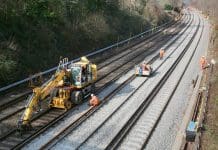The Mayor of London, Sadiq Khan, has set out plans to boost diversity in infrastructure, as a new report commissioned by City Hall revealed women, people from Black, Asian and Minority Ethnic (BAME) backgrounds, disabled and LGBTQ+ Londoners are significantly underrepresented in the industry
Sustainable growth in London is dependent on diverse and inclusive workforce which reflects the city it serves – however many of London’s communities have long been under-represented in the industry.
Supporting diversity and inclusion in the infrastructure sector
The report confirms women are under-represented in the industry compared to the economy as a whole: 21% versus 47% across all industries. Meanwhile, only 6% of those in the industry are from a BAME background, compared to an average of 15% across all industries.
The report identifies a range of socio-economic factors that act as barriers to entering the infrastructure industry. They include the industry having a ‘white male’ image, which is reinforced by a lack of exposure to the sector through school career guidance.
Recommended measures to address this include proactive outreach and mentoring initiatives, as well as better advertising of work experience placements.
More specifically, the Mayor is committing to using his existing London Enterprise Adviser Network to reach every London primary school over the next three years to promote the infrastructure sector and highlight ways in which under-represented communities can make their way into infrastructure careers.
Infrastructure advisory panel
Sadiq has also today launched his new panel, comprising 43 leading figures from the infrastructure and development field who will advise the Mayor on a range of issues. The membership of the panel is 30% BAME and 70% women.
The Mayor of London, Sadiq Khan, said: “In a city as dynamic as London, our infrastructure should be the envy of the world – a vital way of ensuring it’s as good as it possibly can be is to help the sector reflect the range of talent in the capital.
“That’s why I’m proud to announce the steps we’ll be taking to help increase diversity and inclusion in the infrastructure sector.
“I’m clear that your background should never be a barrier to what you can achieve – and I’m determined to do all I can to help London’s best and brightest make use of their skills across this important field.”
The Mayor is also launching measures to help the infrastructure sector cut congestion and disruption:
- Street works pilot schemes will launch in Tower Hamlets and Hackney to promote a ‘dig once’ approach to road and utility works to reduce the amount of disruption to Londoners;
- New service – coordinated by City Hall’s infrastructure team – being piloted in Westminster, Tower Hamlets, and Croydon to help the public and private sector organise infrastructure works for development together;
- Launch of the third version of the Infrastructure Mapping Application (IMA), which helps transport providers, utility companies, boroughs and contractors coordinate roadworks and supports better planning for new homes and businesses.
These measures are aimed at promoting good growth and tackling the huge cost of congestion in London. In 2016, it was estimated that congestion cost the capital £6.2bn and this is forecast to rise to £9.3bn by 2030.
Studies show some 15%– or around £900m – of this is caused by roadworks. In 2018, London drivers lost an average of 227 hours and £1,680 due to congestion.

















